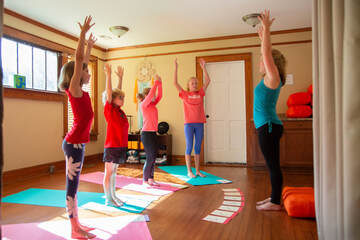Movement for Healthy Development

We know that being physically active is important for people of all ages, but it’s especially important for young kids to be physically active. Making sure to implement movement into their daily lives is the best way to ensure they will reach a high level of physical fitness. Research shows that promoting movement and physical activity in young children increases memory, improves perception, attention skills and decision-making skills (Moyses, K. 2012).
Physical activity and high levels of aerobic fitness in elementary-aged children (7-10 years old) has been shown to benefit brain function, cognition, and school achievement. Studies also show children with higher fitness levels receive better scores on academic tests and show higher performance on real world ‘street crossing tasks’ compared to their peers who have a lower level of physical fitness (Chaddock-Heyman, L., Hillman, C. H., Cohen, N.J., Kramer, A.F., 2014). Another important benefit of physical activity is good mental health and reduced behavioral problems. Studies show physical activity allows children “to have a better outlook on life by building confidence, managing anxiety and depression and releasing endorphins, which correlates to a happy child” (Tala. A., 2017).
Through consistent movement children are able to develop strong hearts and muscles, social interaction skills, co-ordination, self-confidence, communication skills, and concentration. Along with balance skills, kinesthetic memory development, awareness, and increase verbal and non-verbal communication skills (Early Childhood Ireland, 2015).
You don’t have to wait until your kid is in elementary school to begin teaching them the importance of movement and getting them to be physically active. One study conducted by Michigan State University Extension found that you can begin implementing movement into your child’s life the moment they’re born! Here are some ways you can do that:
0-6 months old
- Gently ‘cycle’ their arms and legs
- Let them kick at your hands or a toy
- Play peek-a-boo moving their hands to cover their eyes
6-12 months old
- Stand them on the bed and gently bounce them
- Let them play with pop-up toys to help with hand-eye coordination
- Place a toy just out reach and encourage them to move towards it
12-18 months old
- Take walks with them and talk about things that you see
- Let them play with toys that help them practice filling, dumping, or stacking
- Allow them to play on safe, low places to practice climbing under, over inside of or on top of
18-24 months old
- Allow them to play inside and outside with plenty of room to walk, run, and jump
- Create a safe obstacle course for them to play on
- Allow them to turn pages of the books you read together
24-36 months
- Help them practice kicking by letting them kick a ball
- Play follow the leader, let them be the leader
- Allow them to start dressing and feeding themselves
Read the whole list here.
If you’re looking to help your child be more active, try out some of our workshops and classes! Our schedule is as follows:
Yoga for Kids (ages 6-10) Wednesdays at 4PM
Yoga for Tweens and Teens Mondays 5-6PM
Self Care Workshop for Teens and Tweens- February 8th 6:30-8:15 PM
SOURCES:
Chaddock-Heyman, L., Hillman.C.H., Cohen, L.N., Kramer, F,A. (2014) The importance of physical activity and aerobic fitness for cognitive control and memory in children. Monographs of the society for research in child development. (79), 4. Retrieved from: https://srcd.onlinelibrary.wiley.com/doi/abs/10.1111/mono.12129
Early Childhood Ireland (2015). Why is movement important? Retrieved from: https://www.earlychildhoodireland.ie/work/operating-childcare-service/physical-activity/kids-active/why-is-movement-important/
Moyses, K. (2012). Movement can increase learning in children. Retrieved from: https://www.canr.msu.edu/news/movement_can_increase_learning_in_children
Author
Kelsey Neal is an administrative assistant at Stillpoint Counseling and Wellness and a freelance health and wellness copywriter.
